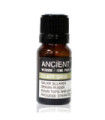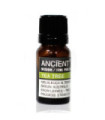Scientific Name : Rosmarinus Officinalis
Plant Part Used : Flowering Tops
Origin : Tunisia
Method of Extraction : Steam Distillation
Rosemary Herb's Essential Oil, derived from the plant's flowers, stems, and leaves, is steam distilled. The British Pharmacopoeia states that the oil extracted from the flowering tops is superior to the oil derived from the stem and leaves, where most commercial oils are believed to originate. The scent of rosemary essential oil, which is woody and herbal, is used in aromatherapy to stimulate and invigorate the mind.
This oil proves beneficial in healing wounds, burns, colds, flu, fatigue, digestive issues, headaches, asthma, bronchitis, gout, rheumatism, liver and gall bladder problems, water retention and poor circulation. For massages, rosemary oil is typically combined with a base oil such as almond, apricot kernel or hazelnut oil. It's beneficial for hair as it is thought to improve scalp circulation and promote hair growth. However, never ingest this oil, and avoid it if you're pregnant, have high blood pressure or epilepsy.
In ancient times, rosemary was well recognized and utilized. It was believed to enhance memory and hence became a symbol of fidelity, used in weddings, funerals, and other religious ceremonies. A sprig of rosemary, adorned with ribbons, was handed to wedding guests as a token of love and loyalty. 'Hungary water,' made by soaking fresh rosemary tops in wine for several days, was reportedly made for the Queen of Hungary and is said to have cured her of paralysis.






